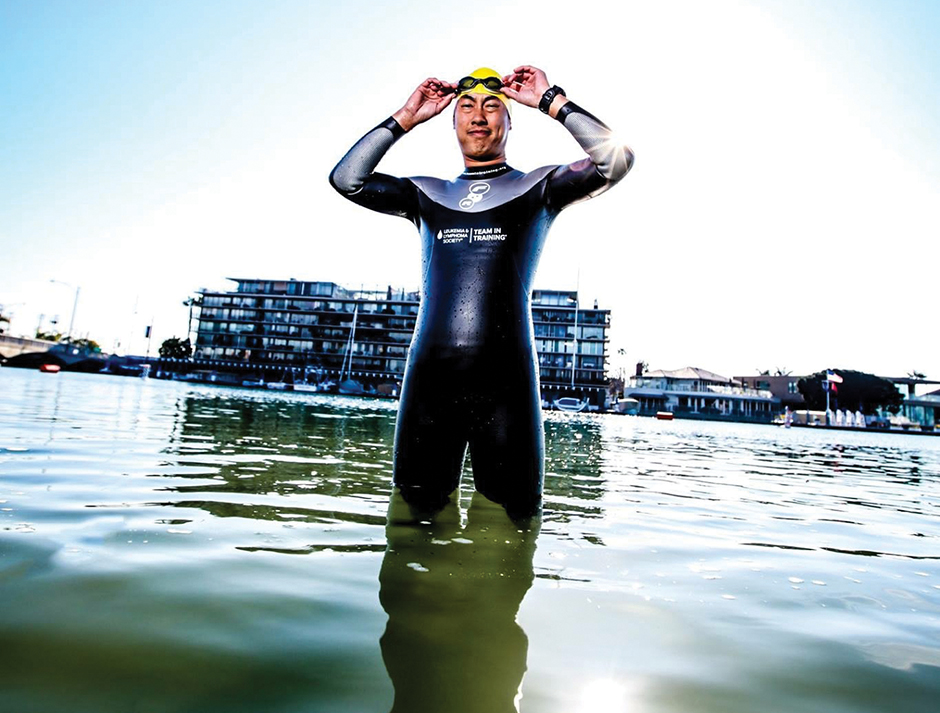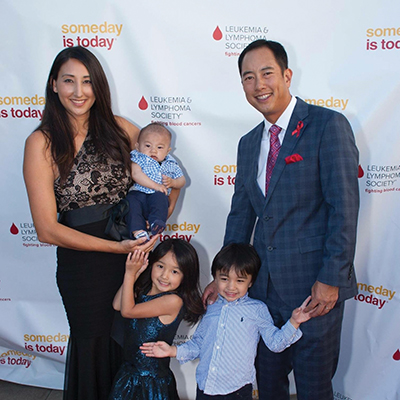a balanced LIFE
How ’01 UCI poli sci alumnus Chris Lee’s battle with non-Hodgkin lymphoma “shaped
everything for the better”

After a battle with non-Hodgkin lymphoma, Chris Lee’s love for competition fueled
him to train for and complete a marathon.
Competition excites Chris Lee. In youth, it’s what drove him to become a nationally ranked junior tennis player. In his career, it’s the motivation behind his rise from bank teller to senior vice president. After a battle with non-Hodgkin lymphoma, it’s what fueled him to train for and complete a marathon. “I wanted to prove to myself that I was back mentally and physically,” he says about that time. Today, Lee seems to have it all. His career in the banking industry has been filled with steady promotions. He’s an active member of the Dean’s Leadership Society at UCI through which he helps the School of Social Sciences raise money to support scholarships, research, and school-wide initiatives. He’s been on the board of trustees for the Leukemia and Lymphoma Society, where he served as president, and where he was named Man of the Year for raising $219,000 over a ten-week period, which was a record at the time. (Yes, he’s even competitive when it comes to charity.)
In addition, he’s in the midst of developing the business council for the Festival of Children, a foundation which provides resources for children’s charities. He’s happily married and the father of three, and when he’s not busy training for a marathon or an ironman triathlon, he admits to overbooking his family’s weekends with social engagements. Most importantly, he’s healthy.
The importance of a college degree
Lee’s life is full and balanced, but this hasn’t always been the case. In his twenties,
he learned hard lessons, which altered how he approached his life. Lee had been recruited
to play tennis for UC Irvine as a freshman and when he arrived to campus, he believed
tennis was his purpose. Academics took a backseat. This was unpopular in his family,
where academics were not only revered, but expected. Getting a college degree was
not a question in the Lee household and in his third year at UCI, he became precipitously
close to being kicked out.
Lee decided to take a quarter off. He needed time to regroup. And while he learned a lot of important lessons about people and sales waiting tables during that quarter (many of which turned out to be useful in his career in banking), the biggest lesson he learned was the importance of a college degree. “I knew there was only so far I could get without it,” he says.
Lesson learnedAmazingly, when Lee reenrolled at UCI the following quarter, he completed three years worth of credits in one. He maxed out the number of units he could enroll in at UCI and simultaneously took classes at Saddleback College, Irvine Valley College, and a computer trade school.There was a big difference when Lee returned to UCI. “I wasn’t there because my parents wanted me to be. I was there for myself,” he says. He may have suffered a setback, but he learned a lot about what he could accomplish when he focused. He learned how to become more efficient with his time. He learned how to work.
I appreciated life and all my friends and family who stuck by me in a different way after I got sick.
Cloud nine
Lee completed his degree in political science in 2001. After graduation, when he was
having trouble getting his foot in the door in the computer industry, a friend recommended
that Lee apply to Wells Fargo. At first, he thought the job would be something that
would hold him over until the computer industry opened up, but he soon discovered
that he was not only good at his job, but he really liked it. Compared to his crazy
college schedule, his job at Wells Fargo felt like a dream. “I could afford not to
live with six people! I didn’t have homework! I was on could nine!” Lee says.
Life in his twenties was good. Lee married his high school sweetheart. He distinguished himself from his colleagues and was promoted along the way. But then he began to develop pain in his lower back and right quad, as well as experience night sweats. The ibuprofen he took to minimize his pain masked some of his symptoms and it took three months to find a diagnosis.

Chris Lee and his family volunteer with
the Leukemia and Lymphoma Society.
A diagnosis
In January 2006, Lee was diagnosed with non-Hodgkin lymphoma. An MRI of his right
pelvis revealed a 3.5 cm tumor. He went through six months of chemotherapy and a month
of radiation and experienced all the side effects that go along with it - the hair
loss, the fatigue, the fluctuations in weight, the compromised immune system. Despite
this, Lee says, “It shaped everything for the better. I know it sounds funny to say
that about cancer. But at that point in my life, I was so materialistic. I realized
I could’ve had a billion dollars in the bank and it would’ve been all for nothing.
I was really humbled. I appreciated life and all my friends and family who stuck by
me in a different way after I got sick.” About a year after remission, Lee was feeling
a little listless and was looking to pour himself into something besides work. He
still enjoyed playing tennis. He still enjoyed watching sports, but he wanted to find
something bigger, something he could be passionate about.
The Leukemia and Lymphoma Society
Soon after, Lee discovered the Leukemia and Lymphoma Society. At first, he joined
their Team in Training, an endurance training program which raises funds for cancer
research. Then he assembled a team of family and friends for Light the Night, a fundraising
walk at Angel Stadium. Over the past 11 years, Lee has participated in a lot of fundraising
campaigns. “The Leukemia and Lymphoma Society has been a good way for me to balance
career, health, and family,” he says. “It’s brought my extended family closer together
as they pitched in with my fundraising efforts. I’ve been able to introduce my kids
to volunteering. I’ve met people who will be friends for life.”
Balance
Today, Lee’s life is one of balance. It’s something he cultivates. “My work with the
Leukemia and Lymphoma Society has become a way of life,” he says. Competition still
excites him, and although he admits that it can still get the best of him at times
(“my wife teases me about how much I still care about winning on the tennis courts”),
it’s not what defines him. He’s been able to combine his love of competition with
his love of people, as well as with his love of volunteering for something he believes
in.


connect with us: